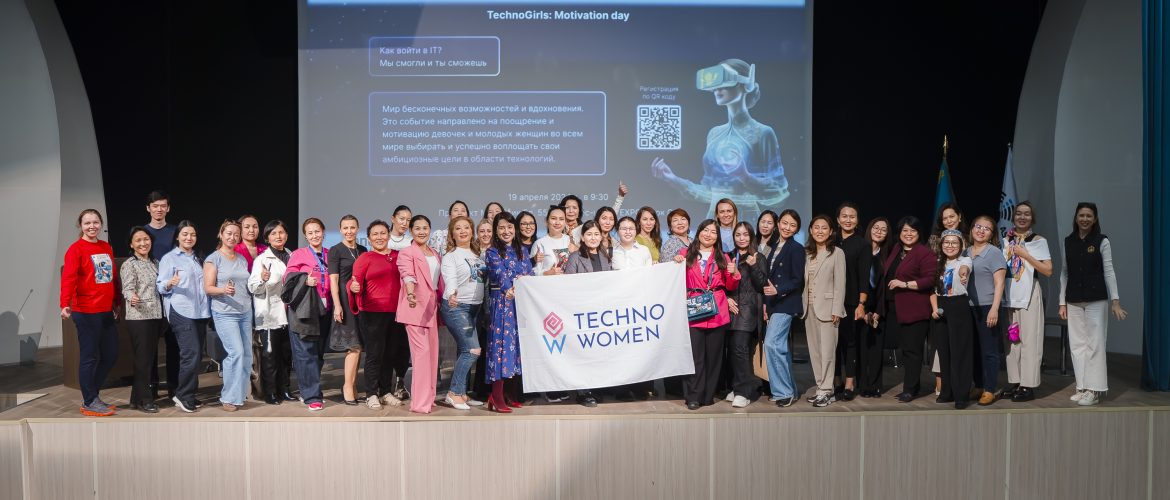The international forum “TECHNOWOMEN CENTRAL ASIA: AI FUTURE”, which was held in Astana at the International Financial Center, became an important event for discussing the practical application of artificial intelligence (AI) in business and society.
The forum brought together several thousand participants, both offline and online, representing various fields of activity and expert communities.
Artificial Intelligence is one of the main trends of our century, which can change the life of every person in the next couple of years, carrying enormous opportunities and the same risks, so it is important now that everyone understands and begins to adapt to the new future.
The general sponsors of the forum were Yandex Kazakhstan and Freedom Holding Corp., official partners were Kcell JSC, Huawei, EPAM, media partners were Bluescreen.kz, Bes.Media, Digital Kazakhstan, The Tech, which held live broadcasts for several days and covered the events.
Within the framework of the 3-day forum the following were held:
- Round table with representatives of government agencies and the expert community “Artificial intelligence: positive opportunities and potential risks”
- Forum for the general public
- Round table for representatives of higher educational institutions
- Master classes on the use of AI, attended by more than 300 women
- Motivation day for students
This is the first broad discussion that brought together international and Kazakh experts from the IT industry, representatives of government agencies, cybersecurity, higher education, NGOs, legal scholars and cultural experts.
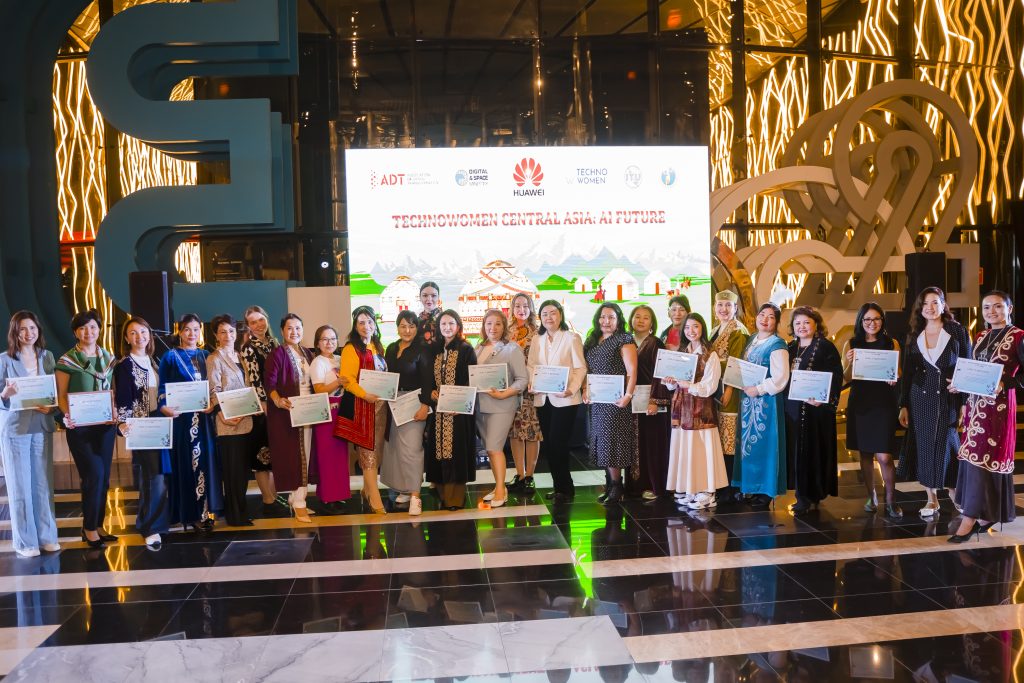
The event took place from April 17 to 19 within the framework of the USAID project for the development of entrepreneurship and the business environment, with the support of the National Commission for Women and Family and Demographic Policy under the President of the Republic of Kazakhstan, the International Telecommunication Union (ITU), the Ministry of Digital Development and Aerospace Industry of the Republic of Kazakhstan, Astana IT University and the International Technopark “Astana Hub”.
Issues of development prospects for Central Asia were raised, government plans, safety for children, the impact on the individual, family and society, investment opportunities and Kazakhstan’s place in this process were announced.
“By 2030, according to authoritative world analysts, IT will become an ordinary women’s profession. Therefore, the country now faces the task of promoting digital skills for women, supporting women’s entrepreneurship in e-commerce and involving them in the AI sector,” Aida Balaeva, Chairman of the National Commission for Women’s Affairs and Family and Demographic Policy under the President of the Republic of Kazakhstan, noted in a message to the event participants.
As part of the Forum, the best projects of 12 girls who completed their training under the “Tech Girls” program, implemented with the support of the National Commission for Women and Family and Demographic Policy under the President of the Republic of Kazakhstan and the International Technopark “Astana Hub”, were pitched. Also, together with the Robotec center, a competition for girls in robotics was held. The team of girls who won the competition received a grant for training from the UBES School of Engineering and Programming, as well as valuable prizes.
«Национальная комиссия по делам женщин и семейно-демографической политики при Президенте Республики Казахстан продвигает повестку «Цифровизация для женщин» и создает условия для вовлечения девочек и женщин в цифровую экономику. Под эгидой Национальной комиссии реализуется успешный проект «IT-Ayel», в рамках которого более тысячи женщин прошли обучение none code, low code программированию, научились делать сайты, мобильные приложения и повысили свои цифровые знания. Сейчас реализуется проект «TechGirls», в котором участвует более 4000 девочек. Этот проект позволит девушкам найти свое место в цифровом мире и сделать карьеру в IT» – подчеркнула Азиза Шужеева, Председатель Правления НКО «TechnoWomen»
«К 2030 году вклад ИИ в мировую экономику составит 15,7 трлн долларов» – отметил вице-министр цифрового развития, инноваций и аэрокосмической промышленности Аскар Жамбакин. «Формируется необходимый технологическая инфраструктуры в виде разработки национальной платформы ИИ, интегрированных более 90 баз данных. На базе Назарбаев центр создается центр компетенций в сфере ИИ. Ведется работа по созданию полноценной эко-системы казахской языковой модели», – сказал Жамбакин.
«Согласно международным исследованиям восемь из 10 женщин (58,87 млн) в составе рабочей силы США заняты в профессиях, в значительной степени подверженных автоматизации с помощью генеративного ИИ (более 25 % профессиональных задач), по сравнению с шестью из 10 мужчин (48,62 млн). В целом женщины подвержены автоматизации ИИ на 21 % больше, чем мужчины, несмотря на то, что мужчин больше, чем женщин в рабочей силе. Это объясняется тем, что в затронутых профессиях больше женщин, чем мужчин. “Сильно подвержены” означает, что 25-50 % задач в данной профессии могут быть автоматизированы с помощью генеративного ИИ»
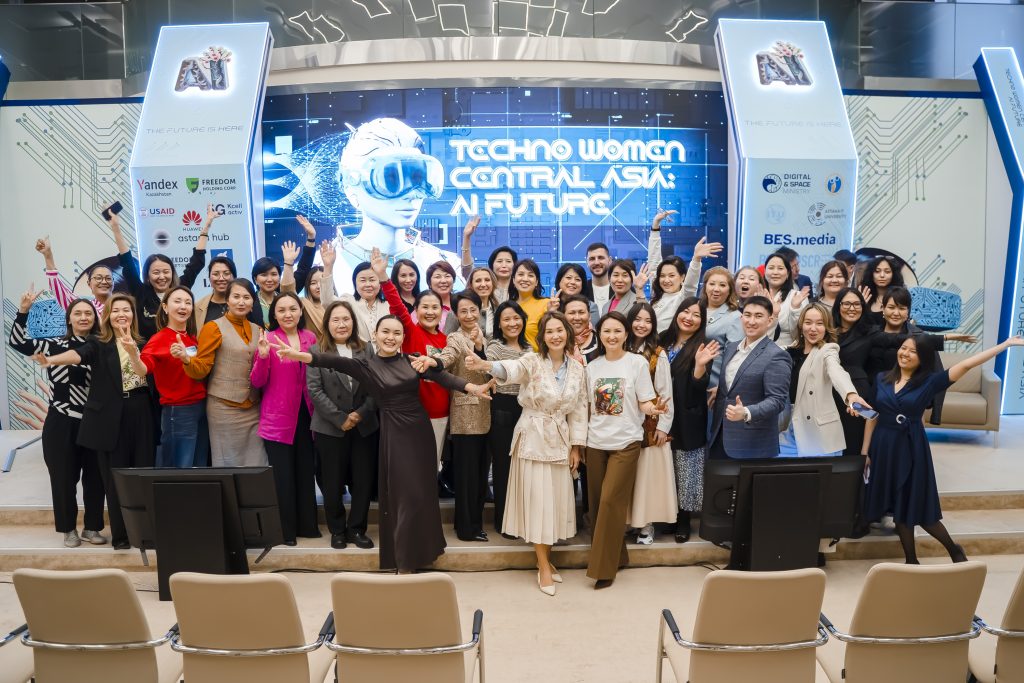
Co-founder of the NGO “TechnoWomen” Bikesh Kurmangalieva noted that AI can become a driver of economic development, but it is very important to modernize the education system, since the study of the use of AI must be introduced into all specialties and professions.
Doreen Bogdan-Martin, Secretary General of the International Telecommunication Union (ITU), addressed the participants via video link. “The International Telecommunication Union (ITU) is committed to creating a platform for everyone involved in AI through our AI for Good program to promote the development of AI applications in all areas of life, make these examples available on a global scale, and unite communities of engineering enthusiasts , developers and, in general, direct AI to achieve the Sustainable Development Goals,” said Natalia Mochu, ITU Regional Director for the CIS region.
Ablaykhan Ospanov, Managing Director of Freedom Bank (Kazakhstan) touched upon the topic of how AI is changing Fintech. According to him, “now all banks are striving to create super-ups – online stores where in one place you can purchase the necessary goods, buy tickets and make payments. But I think that in the near future we will come to the point where super-ups will turn into online consultants. All that remains is to defeat fraudulent activities – deepfakes, voice spoofing. And we will be able to buy tickets and transfer money only with our voice.”
Miraim Atanaeva, director of the RSE “Digital Government Support Center”, for the first time presented the “Concept for the development of AI in Kazakhstan for 2024-2029”, according to which by 2029: for public services using AI will be 20%, it is planned to conduct AI training for 55 thousand specialists , as well as the allocation of grant funding, on average 3.7 billion per year.
Chairman of the Board of NIT JSC Rostislav Konyashkin presented the AI Platform as an infrastructure that allows projects to develop. Developers will have access to tools and services to develop, train, deploy and manage AI applications. Also, through SmartBridge, Data sets from government agencies will be provided, on the basis of which it will be possible to train models developed by private companies. Moreover, 80% of the data has already been collected and prepared.
As part of this strategy, already during the round table, the head of the private project Irbis GPT (Kazakh language model) agreed with the ICRAP on the phased provision of data sets in the Kazakh language to accelerate the development of the language model.
“A major challenge with AI is that the spread of this technology can lead to increased inequality and income polarization. Almost every fifth profession is at serious risk. However, the number of vacancies in the field of STEM (engineering and technical specialties) will double by 2030,” noted Madina Abdrakhmanova, a researcher at Nazarbayev University.
However, with the development of AI, new security challenges arise, especially in the context of sociohacking. According to the Ministry of Internal Affairs, the number of cybercrimes has increased 10-fold over the past 7 years. This highlights the need for more effective measures to protect information and counter cyber threats.
The head of the Strategic Committee, Elena Sedykh, notes that “despite the fact that Kazakhstan entered the race of creating AI late, we still have the opportunity to catch up with other countries. This is possible as long as we act quickly and focus on public awareness and development of AI talent.”
“We are passionate about supporting women who are pushing the boundaries of AI. This event symbolizes our commitment to creating a community where young girls and women can innovate, inspire, and lead in technology,” said Filip Stojanovic, USAID Entrepreneurship and Business Environment Project Manager.
The investment session was attended by Nhi Ly, a representative of one of the largest venture funds “Alfa Capital” (an investor in Open AI). The fund has already invested in a startup with a Kazakh founder in 2023. According to her, the availability of open source code opens up the opportunity for developers from any country to quickly develop innovative AI-based products that can be in demand around the world.
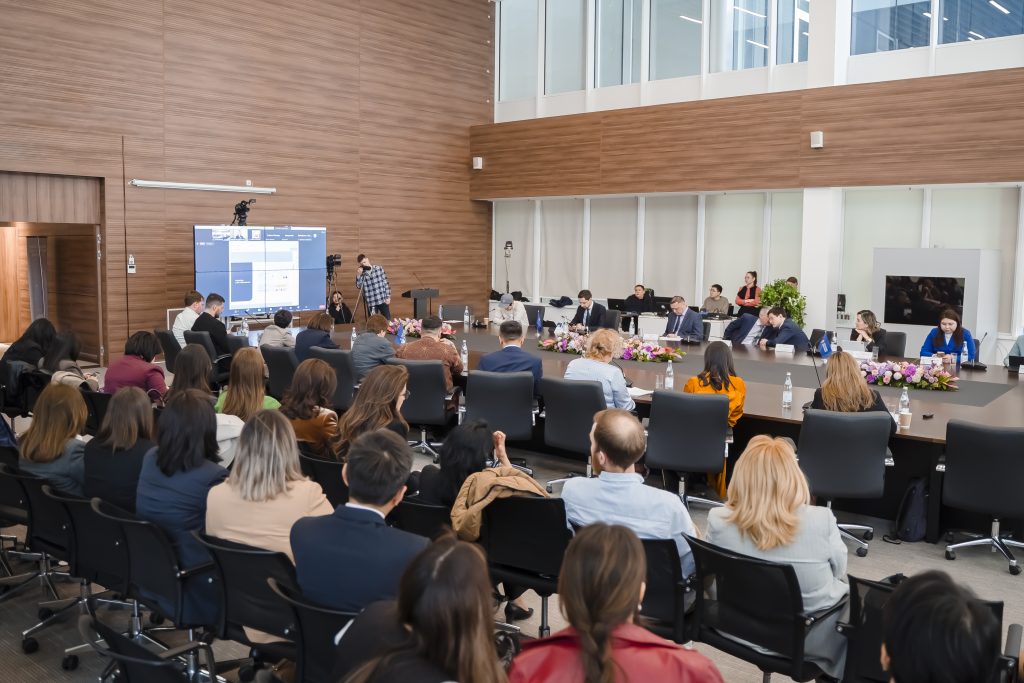
During the investment session, Talgat Amanbaev, AIFC Innovation Director, also shared his plans for the development of a financial center so that startups could attract foreign investment without registering abroad. In particular, one of the priority initiatives is to finalize the legal norms on copyright for intellectual property.
As part of a round table for universities, the Rector of South Korean Woosong University shared the practical experience of an online learning platform based on AI. Answering the moderators’ question about what work should governments do to develop AI, Professor Yoo Taek Lee said that “it is necessary to create conditions for the younger generation, who are already in the global community, so that they can apply innovative approaches, be at the forefront along with others.”
“I am very pleased that such a progressive topic is being promoted in Central Asia under the auspices of TechnoWomen, which makes a great educational and practical contribution to the involvement of girls and women in digitalization, helping them find their niches in the digital world,” said Zaituna Saidullaeva, an IT entrepreneur from Tajikistan.
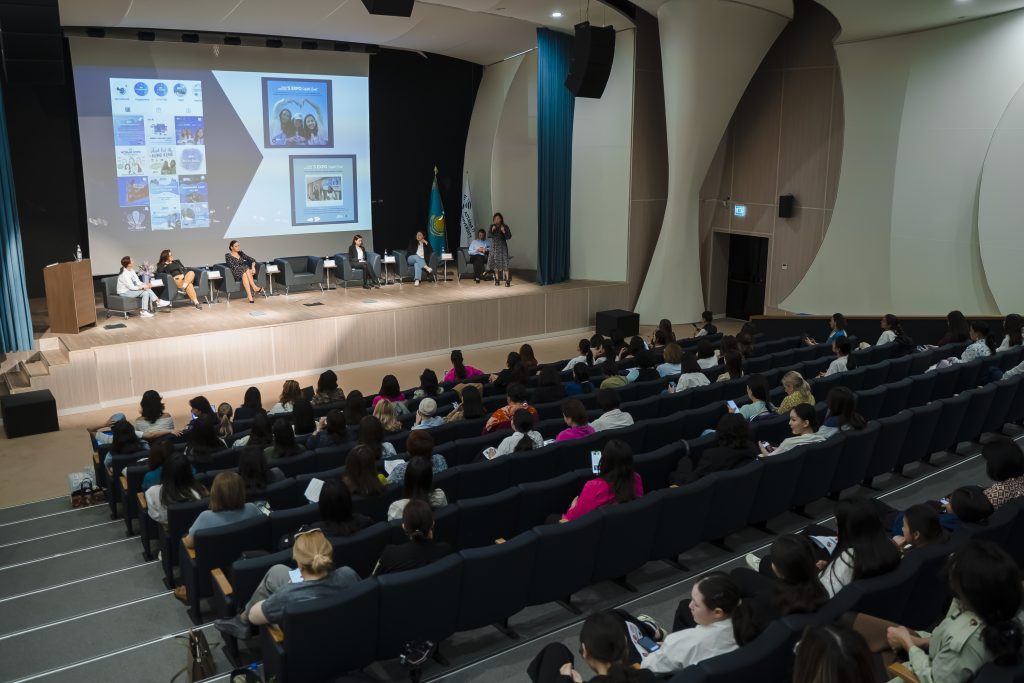
Deputy General Director of Huawei Technologies Kazakhstan Farida Tuleubaeva emphasized that AI today is not a fashionable trend, but “a real need across the market.” “We all see the boom that happened in 2022 with the arrival of ChatGPT, and these numbers will grow exponentially in the next 10 years. To be prepared for the big changes ahead, we must prepare the right infrastructure, create a data center base for massive data processing and ensure uninterrupted power supply. Huawei sees that now there are challenges to provide AI with sufficient electricity and a full-fledged data center infrastructure, so this topic needs to be discussed with all interested market players,” said Farida Tuleubaeva.
Director for Transformation of the Network division of Kazakhtelecom JSC and member of the NPO TechnoWomen Marzhan Orazmuhamedkyzy: “I am glad that Technowomen Central Asia allowed me to find out a woman’s view and point of view on this topic. Today, the team of my company JSC Kazakhtelecom has about 20 thousand employees, of which 6 thousand are women. At the same time, representatives of the fair sex make up 30% of the total number of Kazakhtelecom managers; it is also a remarkable fact that in the largest block of the company – technical – a quarter of the employees are female, a third of the production staff are also women. Many of my colleagues began their career path with the simplest positions and specialties and, thanks to their hard work, skills and aspirations, achieved very great results professionally.”

As part of the forum, the results of the “TechnoWomen Leaders 2023” competition were summed up; the winners were:
1. In the “Digital Empowerment Volunteer” category the winners were: the Public Foundation “Kinergy” for the Technovation Girls project and the National Association of Women Entrepreneurs ASMAR for their contribution to the development of women’s entrepreneurship in the regions;
2. In the category “Women’s Digital Education Excellence” the winners were: International Technopark “Astana Hub” for the project “IT Ayel” – training women in none code and low code programming, more than 2000 women participants. The Akyl Ayim project from Kyrgyzstan to train more than 600 women in rural areas in digital skills, implemented by TechnoWomen KG.
- Sabira Kulchimbaeva won in the “Digital Technology Excellence” category with the “Banana mama” project, which helps women prepare for childbirth using digitalization.
Memorandums were signed by “TechnoWomen”, the school “Robotec” and the online platform Lerna for the development of digital competencies of girls and women.
To support flood-affected residents of the regions, the NGO “TechnoWomen” launched the “Zhalgyz Yemessin” project, which is focused on solving three problems – collecting gadgets (modems, tablets, laptops) for schoolchildren so that they can continue distance learning, launching an online psychological and medical care, collection of hygiene products and infant formula.
Based on the results of the forum, a report with theses and presentations from speakers will be prepared and publicly published.
For reference: “Techno Women” is a non-profit organization that unites women working in technology industries: IT, digital, telecom, media, Fintech, Edutech, Healthtech, Biotech, Ecotech, Nanotech, Robotics, space and other high-tech industries. TECHNOWOMEN’s mission is to open new opportunities for girls and women in the digital world. TECHNOWOMEN’s vision is an international network of a community of progressive women who contribute to the transformation of society, the promotion of gender equality, fair competition, the use of advanced technologies, the development of digital culture and the education of a highly educated, spiritually rich and socially responsible new generation.
